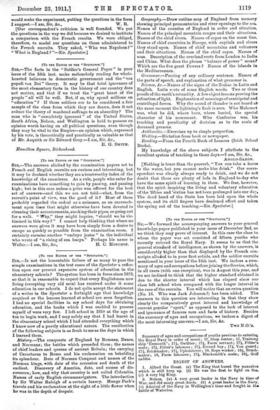[To THE EDITOR or THE "81ECTATOR."1 SIB,—Is not the lamentable
failure of so many to pass the simple examinations in the test cases of the Spectator a reflec- tion upon our present expensive system of education in the elementary schools ? The system has been in force since 1873, so that it is reasonable to expect that every Englishman now living (excepting very old men) has received under it some education in our schools. I do not quite accept the statement of a writer in the Spectator a fortnight ago that knowledge acquired or the lessons learned at school are soon forgotten.
I had no special facilities in my school days for obtaining education, and the books which I was enabled to possess myself of were very few. I left school in 1859 at the age of ten to begin work, and I may safely say that I had learnt in the elementary school which I had attended everything which
I know now of a purely educational nature. The recollection of the following subjects is as fresh to me as the days in which I learned them.
History.—The conquests of England by Romans, Danes, and Normans ; the battles which preceded them ; the names of chief leaders and queens of ancient Britain; the carrying of Caractacus to Rome and his exclamation on beholding its splendour. Date of Norman Conquest and names of the Norman kings, with date of the accession and death of the earliest. Discovery of America, date, and names of dis- Coverers ; how, and why that country is not called Columbia. Names of early English circumnavigators. The introduction by Sir Walter Raleigh of a certain luxury. Mungo Park's travels and his exclamation at the sight of a little flower when he was in the depth of despair. Geography.—Draw outline map of England from memory showing principal promontories and river openings to the sea. Names of the counties of England in order and situation. Names of the principal mountain ranges and their situations. Names of the chief rivers. Names of capes on the coast line. Names of chief countries in Europe, with capitals and rivers they stand upon. Names of chief mountains and volcanoes and their situations. Names of the chief capes. Names of seas. Description of the overland route from London to India and China. What does the phrase "balance of power" mean? Which are the five great Powers P Names of the islands in the Mediterranean.
Grammar.—Parsing of any ordinary sentence. Names of the parts of speech, and explanation of what grammar is.
Science, &c.—Names of the signs of the Zodiac in Latin and English. Latin mots of some English words. Two or three proofs of the earth's rotundity. A few object lessons proving the refraction of light. Explanation of meanings of centripetal and centrifugal forces. Why the sound of thunder is not heard ai the same moment the lightning's flash is seen. Who Mahomet was, what he did, where born, where buried, the special character of his monument. Who Confucius was, his teaching and peculiarity of doctrine as to the souls of deceased persons.
Arithmetic.—Exercises up to simple proportion.
Writing.—Dictation from book or newspaper.
.Reading.—From the Fourth Book of Lessons (Irish School Books).
My knowledge of the above subjects I attribute to the excellent system of teaching in those days.—I am, Sir, &c., ANGLO-SAXON.
[Nothing is truer than the proverb, "Yon can take a horse to the water, but you cannot make him drink." Our corre- spondent was clearly always ready to drink, and we do not doubt that there are plenty of lads in England to-day who have the same spirit of learning in them. We fear, however, that the spirit inspiring the living and voluntary education of the 'fifties and 'sixties has not been prolonged into our day. The dead hand of the State has been laid upon the whole system, and its chill fingers have deadened effort and taken the spring out of the teaching.—ED. Spectator.


































 Previous page
Previous page